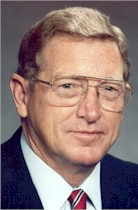Event: Senate Communications Subcommittee hearing.
Re: broadband deployment in rural America.
Date: March 28, 2000.
Source: Senate Commerce Committee. This page was created by scanning a paper copy and converting to HTML.

| Opening statement of Sen. Conrad Burns (R-MT). Event: Senate Communications Subcommittee hearing. Re: broadband deployment in rural America. Date: March 28, 2000. Source: Senate Commerce Committee. This page was created by scanning a paper copy and converting to HTML. |
 |
|
|
|
||
Statement of Senator Conrad Burns
Senate Communications Subcommittee
Hearing on Broadband Deployment in Rural America
March 28, 2000
The topic of today's hearing is critical to the future of this country: how to speed the deployment of broadband technology to rural America.
In a few short years, the Internet has grown exponentially to become a mass medium used daily by over 100 million people worldwide. The explosion of information technology has created opportunities undreamed of by previous generations. In my home state of Montana, companies such as Healthdirectory.com and Vanns.com are taking advantage of the global markets made possible by the stunning reach of the Internet.
The pace of broadband deployment to rural America must be accelerated for electronic commerce to meet its full potential, however. Broadband access is as important to our small businesses in Montana as water is to agribusiness. I am convinced that the proper use of Section 706 of the Telecommunications Act can help to bring these advanced data services to underserved areas. I authored Section 706 during the crafting of the Act to allow the FCC to provide deregulatory incentives so that telecommunications firms would invest in broadband technologies. Yet in its report on broadband deployment last year, the Commission refused to use its Section 706 authority, citing the spread of broadband technologies across the nation, even though only 2% of Americans had broadband access. I will not allow Section 706 to be dismantled through FCC inaction.
I am aware of all of the recent discussion regarding the "digital divide" and I am very concerned that the pace of broadband deployment is greater in urban than rural areas. However, there is some positive and exciting news on this front as well. The reality on the ground shows that some of the "gloom and doom" scenarios are far from the case. In Montana, just two weeks ago, excite@home deployed cable modem service to Billings and announced its intention to expand to other areas around the state. Also, by pooling their limited resources, Montana's independent and cooperative telephone companies are doing great things.
A group of 10 of these small companies has formed the Montana Advanced Information Network, also known as MAIN. MAIN has a 1,000 mile+ fiber loop around the state providing circuits for applications such as Internet, long distance, telemedicine, distance learning, video conferencing and data networking.
A group of five telephone cooperatives has formed a company called Vision Net that provides high-speed Internet services to communities throughout Montana. Vision Net has 67 sophisticated interactive video conferencing studios across the state, including 40 sites in public schools and sites in all 7 of the state's tribal colleges.
A group of 3 telephone cooperatives and 3 electric cooperatives have joined forces to form Skyland Technologies. Skyland has built a "fiber hotel," in Billings, Montana. The fiber hotel provides a place for incumbent and competitive telecommunications providers, Internet service providers, Internet and e-commerce based businesses and others to locate their equipment without having to go to the time and expense of constructing their own facilities. Tenants can select from a variety of fiber networks that terminate in the hotel to choose the best price and routing solutions for transport of their telecommunications traffic to locations of their choosing, including Internet backbone locations in major metropolitan areas.
Just last week, I met with an organization called the Montana Independent Telecommunications Systems, which is working to design and construct Montana's first true Internet Network Access Point. This would provide a high-speed on-ramp to one or more national Internet backbone networks.
Another reason for optimism in this critical area is the tremendous work done by one of our witnesses, Bob Rowe is president of the National Association of Regulatory Utility Commissioners and a Montana Public Service Commissioner, as well as a member of the Universal Service Joint Board. Bob also recently convened the first joint conference of the FCC and state public service commissioners to study how Section 706 can be used to bring high-speed communications to rural areas. Frankly, I don't know how he gets it all done, but he is one of the most dedicated public servants I've ever known and a great asset to the state of Montana.
I would also like to extend a special welcome to John Fitzpatrick, who is representing Touch America. Touch America is a subsidiary of Montana Power that is headquartered in Butte, Montana. Touch America operates a huge nationwide fiberoptic network that will reach over 26,000 miles in the next year or so, much of it in rural areas.
I look forward to the testimony of all the witnesses on this vital issue to rural America. Thank you.